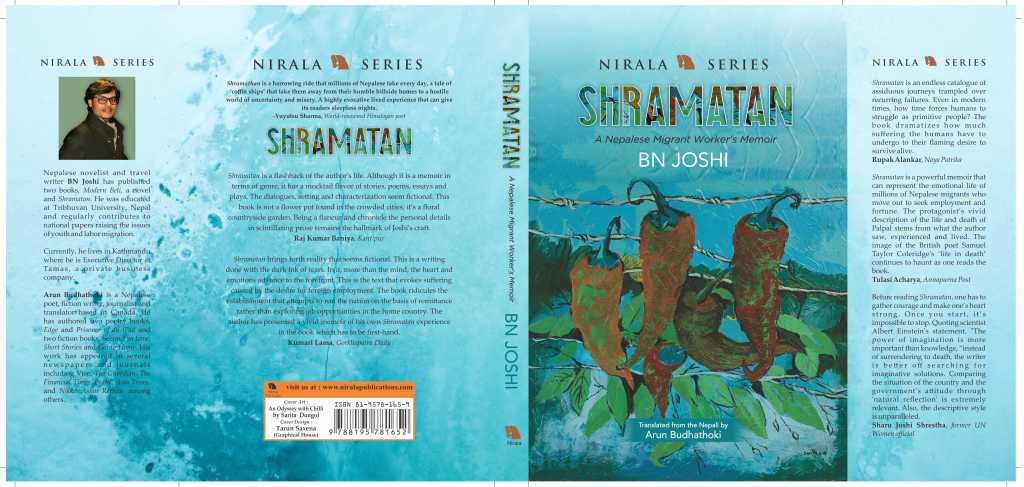Shramatan is a harrowing ride that millions of Nepalese take every day, a tale of ‘coffin ships’ that take them away from their humble hillside homes to a hostile world of uncertainty and misery. A highly evocative, lived experience that can its readers sleepless nights.
– Yuyutsu Sharma, world-renowned Himalayan poet
Shramatan is a flashback of the author’s life. Although it is a memoir in terms of genre, it has a mocktail flavor of stories, poems, essays and plays. The dialogues, setting and characterization seem fictional. This book is not a flower pot found in the crowded cities, it’s a floral countryside garden. Being a flaneur and chronicle the personal details in scintillating prose remains the hallmark of Joshi’s craft.
–Raj Kumar Baniya, Kantipur
9 years and above
216
978-81-957816-5-2
January 1, 2023
English
Nirala Publication
Secure Transaction
Fast Delivery
Shramatan is a harrowing ride that millions of Nepalese take every day, a tale of ‘coffin ships’ that take them away from their humble hillside homes to a hostile world of uncertainty and misery. A highly evocative, lived experience that can its readers sleepless nights.
– Yuyutsu Sharma, world-renowned Himalayan poet
Shramatan is a flashback of the author’s life. Although it is a memoir in terms of genre, it has a mocktail flavor of stories, poems, essays and plays. The dialogues, setting and characterization seem fictional. This book is not a flower pot found in the crowded cities, it’s a floral countryside garden. Being a flaneur and chronicle the personal details in scintillating prose remains the hallmark of Joshi’s craft.
–Raj Kumar Baniya, Kantipur
Before reading Shramatan, one has to gather courage and make one’s heart strong. Once you start, it’s impossible to stop. Quoting scientist Albert Einstein’s statement, “The power of imagination is more important than knowledge, “instead of surrendering to death, the writer is better off searching for imaginative solutions. Comparing the situation of the country and the government’s attitude through ‘natural reflection’ is extremely relevant. Also, the descriptive style is unparalleled.
–Sharu Joshi Shrestha, former UN Women official
Shramatan is a powerful memoir that can represent the emotional life of millions of Nepalese migrants who move out to seek employment and fortune. The protagonist’s vivid description of the life and death of Palpal stems from what the author saw, experienced and lived. The image of the British poet Samuel Taylor Coleridge’s ‘life in death’ continues to haunt as one reads the book.
–Tulasi Acharya, Annapurna Post
Shramatan is an endless catalogue of assiduous journeys trampled over recurring failures. Even in modern times, how time forces humans to struggle as primitive people? The book dramatizes how much suffering the humans have to undergo to their flaming desire to survive alive.
–Rupak Alankar, Naya Patrika
Shramatan brings forth reality that seems fictional. This is a writing done with the dark ink of tears. In it, more than the mind, the heart and emotions advance to the forefront. This is the text that evokes suffering caused by the desire for foreign employment. The book ridicules the establishment that attempts to run the nation on the basis of remittance rather than exploring job opportunities in the home country. The author has presented a vivid memoir of his own Shramatan experience in the book which has to be first-hand.
–Kumari Lama, Gorkhapatra Daily
This book has exposed the hidden side of truth and resultant societal insinuation of the foreign employment. The author has dared to bring to light the social incongruities and human degradation triggered by deportation and transnational human trafficking. There’s a great deal about failures and ineffectual implementation of the Nepalese government’s policies. The language is emotionally surcharged and compelling. For example: The sound of crying gets stifled in the sea. So does a slice of dried meat found in the central desert.
–Dr. Somlal Subedi, Former Chief Secretary, Government of Nepal

Nepalese novelist and travel writer BN Joshi was educated at Tribhuvan University, Nepal and has published two books, Modern Beli, a novel and Shramatan. Joshi regularly contributes to national papers raising the issues of youth and labor migration.
He lives in Kathmandu and works as Executive Director at Tamas, a private business company.
Arun Budhathoki is a Nepalese poet, fiction writer, journalist and translator based in Canada. He has authored two poetry books, Edge and Prisoner of an iPad and two fiction books, Second in Love: Short Stories and Going Home. His work has appeared in several newspapers and journals including Vice, The Guardian, The Financial Times, Pratik, Asia Times, and Nikkei Asian Review, among others.
Sarita Dongol is a freelance visual artist with a Master degree in Fine arts from Tribhuvan University, Kathmandu, Nepal. She is the Lecturer at Himalayan College of Architecture. In addition, her 12 solo art exhibitions in Nepal, Japan, France and Australia, her works have also been exhibited in many national and international Galleries since 1992. She received South Asian artist residency in Fukuoka , Japan 2002, South Korea in Gwanju 2006. International artists residency The floating Peers, Bangladesh 2014. She was awarded a Gold medal from Arniko Yuwa Sekwas Kosh 2011


Sign up for our newsletter to receive special offers and events.
niralapublications@gmail.com

Copyright © 2024 Nirala Publications
Designed & Developed with ♥ By Hemant Bhatta
Reviews
There are no reviews yet.